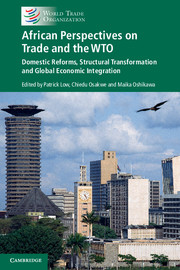 African Perspectives on Trade and the WTO
African Perspectives on Trade and the WTO Book contents
- African Perspectives on Trade and the WTO
- African Perspectives on Trade and the WTO
- Copyright page
- Contents
- Figures
- Plates
- Contributors
- Message
- Joint Foreword
- Book part
- Glossary
- Disclaimer
- 1 Introduction and Overview
- Part I The Future of the Multilateral Trading System: Perspectives from African Policy-Makers and Partners
- 2 African Union Priorities at the WTO
- 3 Economic Diversification in Africa’s Number One Economy
- 4 Trade, Investment and Development
- 5 Integration into Global and Regional Value Chains – How Is It Done? The Experience of Lesotho in the Textiles and Apparel Sector
- 6 From Marrakesh to Nairobi: Africa – A Force for the World Trading System: From the Past Twenty Years to the Next Twenty Years
- 7 Building Capacity in Africa to Facilitate Integration into Global Value Chains: Contributions from the ITC
- 8 Investment and Trade Rules: Increasing the Stock of African Foreign Direct Investment Flows
- 9 Deepening African Integration: Intra-African Trade for Development and Poverty Reduction
- Part II Africa’s Participation in the Rules-Based Multilateral Trading System
- Part III Selected Development Experiences and Perspectives
- Book part
- Index
- Plate Section (PDF Only)
- Book part
7 - Building Capacity in Africa to Facilitate Integration into Global Value Chains: Contributions from the ITC
from Part I - The Future of the Multilateral Trading System: Perspectives from African Policy-Makers and Partners
Published online by Cambridge University Press: 27 October 2016
- African Perspectives on Trade and the WTO
- African Perspectives on Trade and the WTO
- Copyright page
- Contents
- Figures
- Plates
- Contributors
- Message
- Joint Foreword
- Book part
- Glossary
- Disclaimer
- 1 Introduction and Overview
- Part I The Future of the Multilateral Trading System: Perspectives from African Policy-Makers and Partners
- 2 African Union Priorities at the WTO
- 3 Economic Diversification in Africa’s Number One Economy
- 4 Trade, Investment and Development
- 5 Integration into Global and Regional Value Chains – How Is It Done? The Experience of Lesotho in the Textiles and Apparel Sector
- 6 From Marrakesh to Nairobi: Africa – A Force for the World Trading System: From the Past Twenty Years to the Next Twenty Years
- 7 Building Capacity in Africa to Facilitate Integration into Global Value Chains: Contributions from the ITC
- 8 Investment and Trade Rules: Increasing the Stock of African Foreign Direct Investment Flows
- 9 Deepening African Integration: Intra-African Trade for Development and Poverty Reduction
- Part II Africa’s Participation in the Rules-Based Multilateral Trading System
- Part III Selected Development Experiences and Perspectives
- Book part
- Index
- Plate Section (PDF Only)
- Book part
Summary
While Africa’s share of global value-added trade has increased significantly during the past 20 years, connecting African small and medium-sized enterprises (SMEs) to value chains and turning the support for greater intra-African trade into a reality remains challenging. Ensuring that the trade discourse is fully integrated into this development story is critical and countries, especially those that have recently acceded, have to be supported to recognise and take advantage of the global trading system and their WTO membership. To place a spotlight on trade-led growth for SMEs, the International Trade Centre (ITC) launched its SME Competitiveness Outlook in 2015. This flagship publication identified three key determinants of SMEs’ ability to integrate into value chains: their ability to compete, connect and change. The ITC’s capacity-building interventions, which have a strong focus on African countries, are centred on helping SMEs become more competitive and connect to value chains to drive the continent’s sustainable economic development.
- Type
- Chapter
- Information
- African Perspectives on Trade and the WTODomestic Reforms, Structural Transformation and Global Economic Integration, pp. 43 - 51Publisher: Cambridge University PressPrint publication year: 2016


